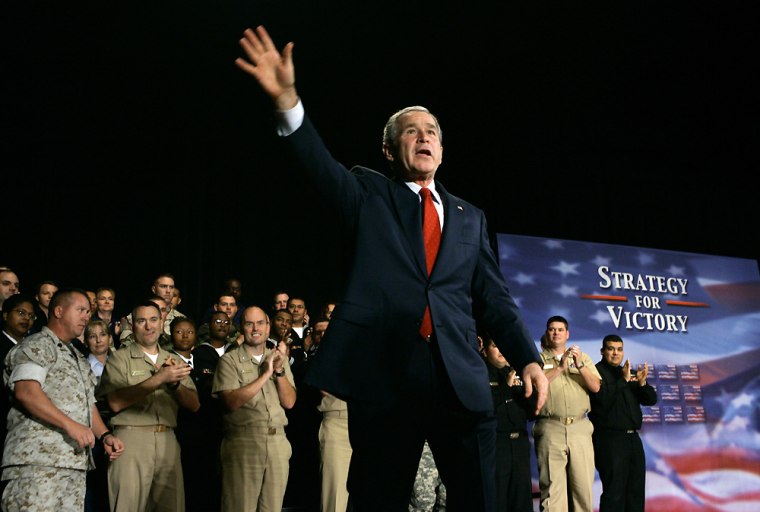At a turbulent point in his presidency, President Bush sought to bolster public backing for his war policies Friday, just days after the U.S. death toll in Iraq surpassed 2,000.
“We will never back down, we will never give in and we will never accept anything less than complete victory,” the president said.
Delivering remarks nearly identical to those he gave earlier this week, the president spoke in a largely friendly environment — a community with an enormous military presence in a state he won comfortably over Democrat John Kerry last fall during a re-election race dominated by national security.
“Thanks for the chance to get out of Washington,” Bush told his audience, made up heavily of military members.
In the nation’s capital, about 200 miles north, an anxious White House awaited the results of a special prosecutor’s investigation of two top aides in connection with the leak of a CIA operative’s identity.
Later in the day, vice presidential adviser I. Lewis “Scooter’ Libby Jr. resigned after being indicted on charges of obstruction of justice, making a false statement and perjury in the case. Karl Rove, Bush’s closest adviser, escaped indictment but remained under investigation.
Court nominee setback earlier in week
The president’s advisers also were wrestling over a new nomination to the Supreme Court in place of Harriet Miers, who withdrew her name from consideration Thursday. It was a stunning setback for a president whose popularity is at record lows, his poll numbers dragged down by a host of troubles including Iraq and soaring gas prices.
Bush’s new bid to turn public opinion on the Iraq war and focus attention away from his troubles in Washington resembles an election campaign, where it is considered effective to keep repeating the same speech. The speech in Norfolk was nearly the same as the one he delivered Tuesday in Washington. And that speech was a virtual repeat of an Oct. 6 address.
Outside the Norfolk convention hall, a small group of anti-war protesters greeted him by chanting “Bush lies.”
Inside, as the president spoke, a man on the second level interrupted him, yelling “Mr. President, war is terrorism. War is terrorism. Step down now, Mr. President. Torture is terrorism.” Bush continued speaking as security officials escorted the man from the hall.
War support at 37 percent
AP-Ipsos polling shows that public support for Bush’s handling of Iraq is at its lowest point, 37 percent, roughly where it has been since early August, and fewer than half of Americans, 46 percent, approve of Bush’s handling of foreign policy and the war on terrorism.
Mindful of the public anxiety, the president attempted to underscore the danger the United States faces from terrorists, comparing leaders of al-Qaida to historical villains Adolf Hitler, Joseph Stalin and Pol Pot.
“Evil men obsessed with ambition and unburdened by conscience must be taken very seriously and we must stop them before their crimes multiply,” he said.
He also took aim again at Syria and Iran — as he did on Tuesday — calling the two countries allies of terrorists. And he again embraced the approval of a new Iraqi constitution Oct. 15 as a sign that democracy is taking root and the United States should stay the course.
Citing progress in Iraq
“Iraq has made incredible political progress,” he said. “No fair-minded person should ignore or deny or dismiss the achievements of the Iraqi people.”
Bush was speaking in Virginia just days before voters elect a new governor. However, Republican candidate Jerry Kilgore, who served as chairman of Bush’s re-election campaign in the state last year, did not appear with the president.
Kilgore denied that he was one of a growing number of GOP candidates across the country who are distancing themselves from the president and the war. He has said he simply wasn’t invited. The White House described the event as official, not political.
